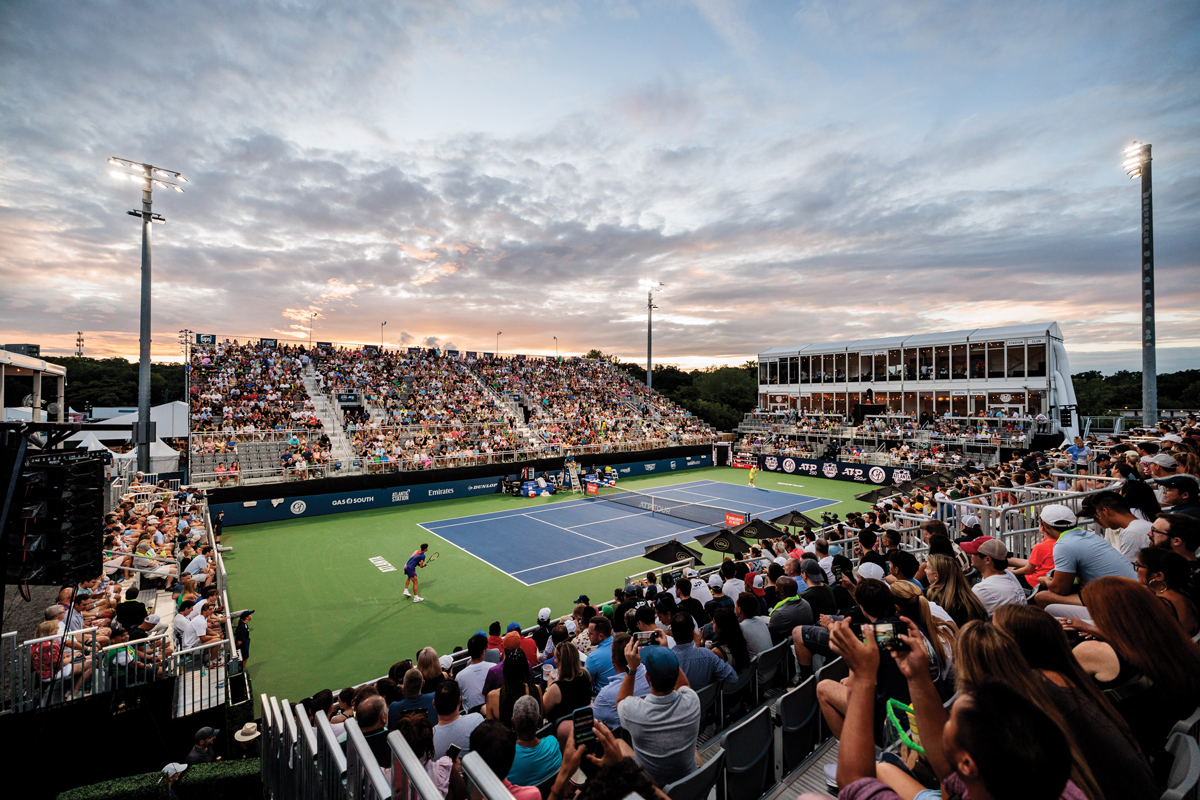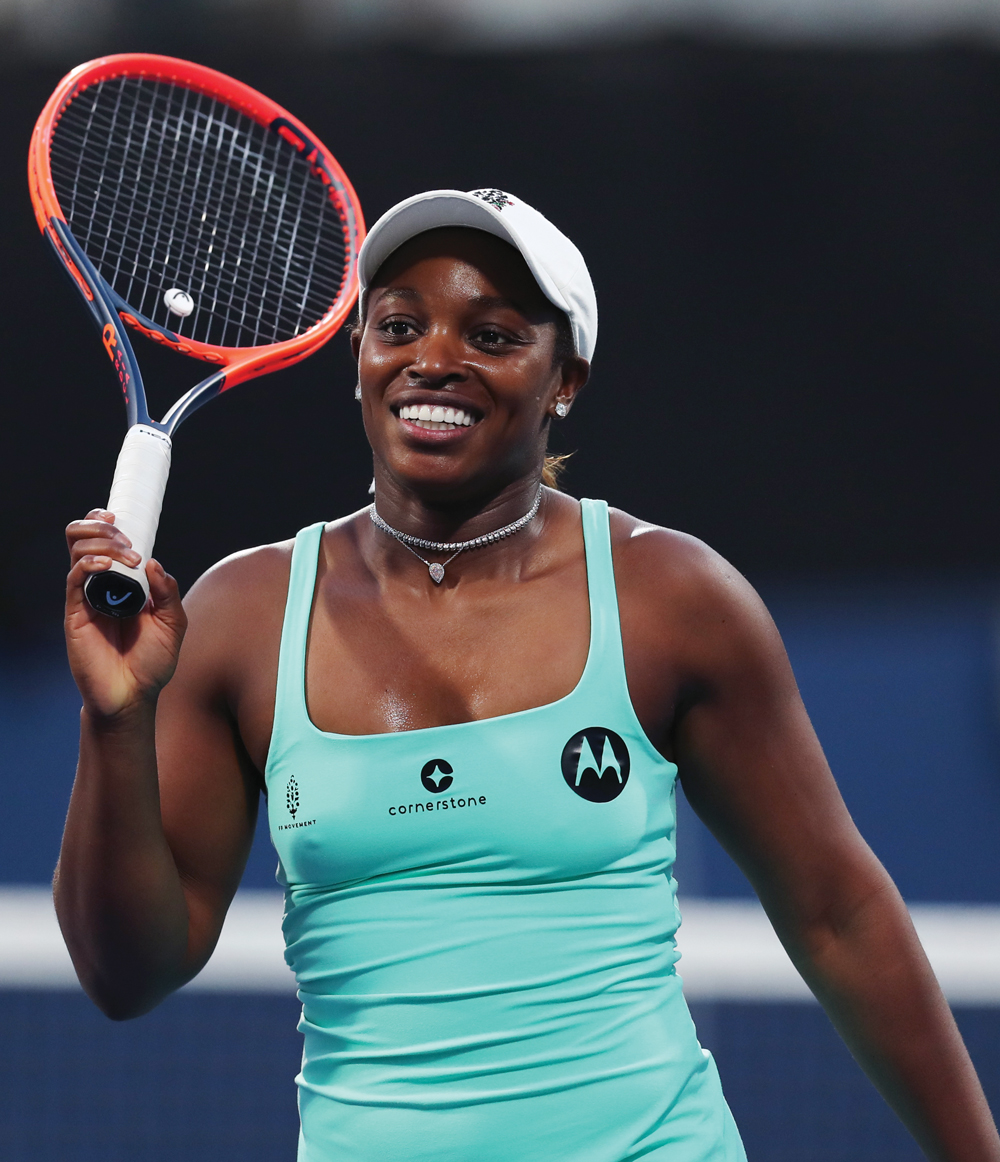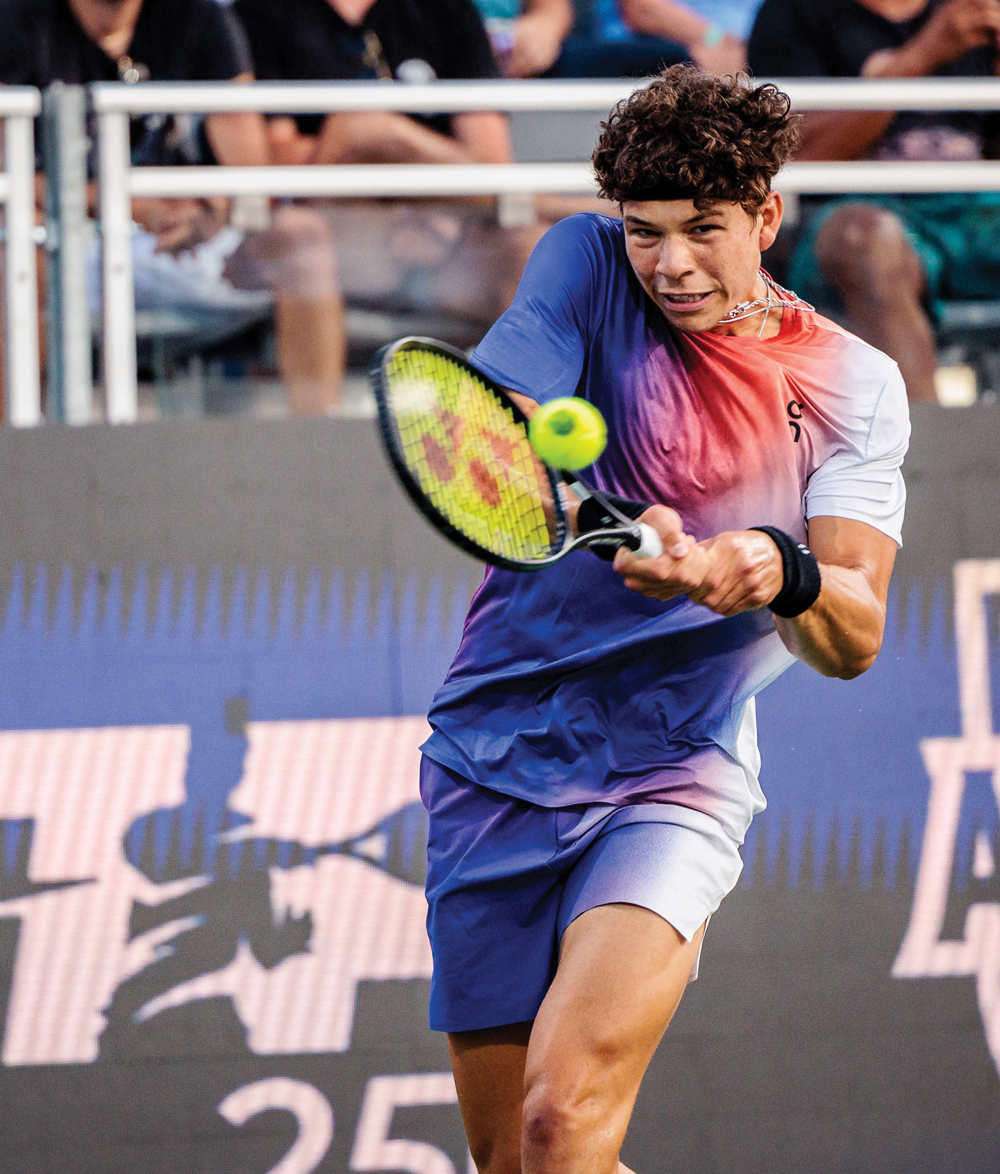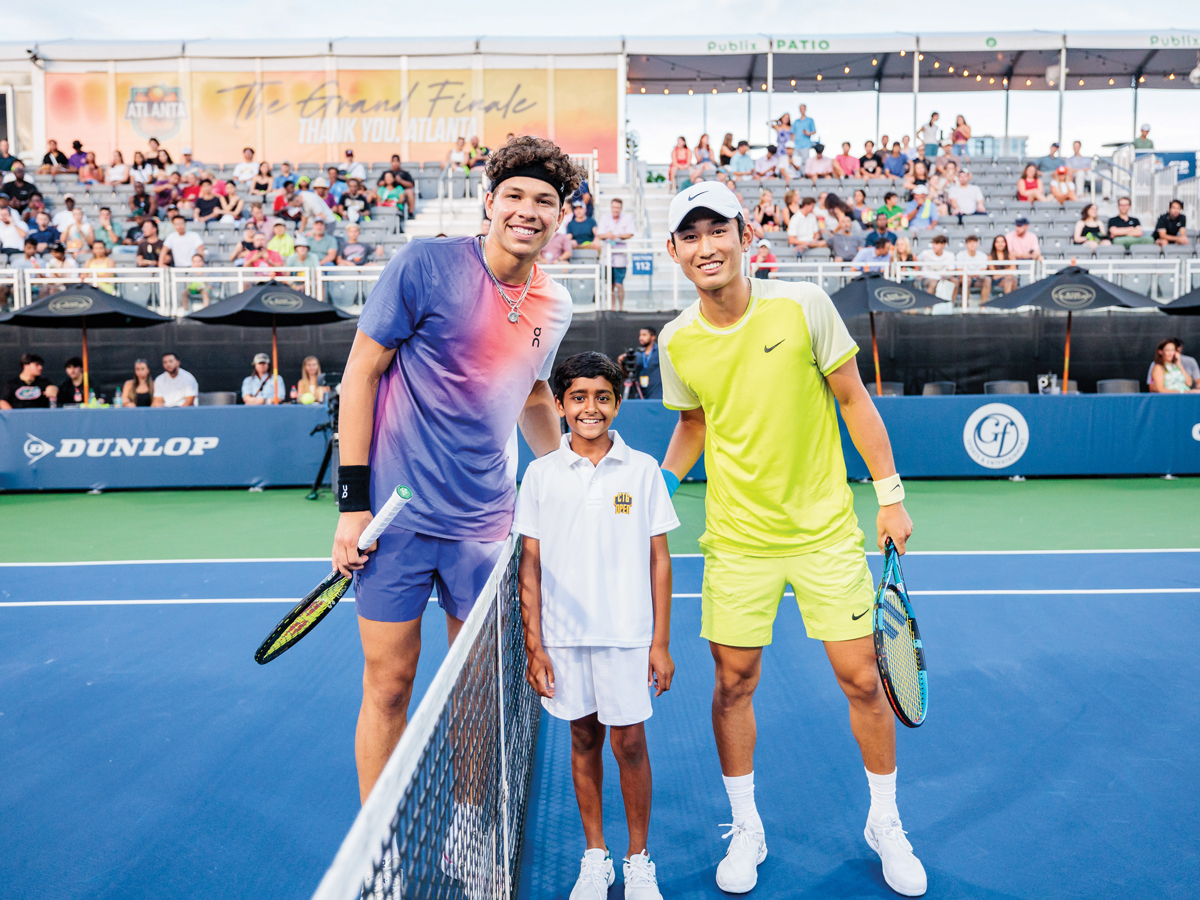
Photograph by Nick Grace
The first night of the last Atlanta Open is drenched in rain. Like all July storms, this one comes on strong and sudden but at least starts before any tennis is played. I join hundreds of fans for cover underneath a concessions tent labeled the “Food Court.”
Tonight is the Sunday Showdown, between Taylor Townsend and Sloane Stephens. The showdown is an exhibition match played every year by women’s tennis stars, but its outcome bears no weight on them or the Atlanta Open, an event on the ATP Tour, the men’s professional tennis circuit. Originally, Venus Williams was scheduled to play but withdrew, so Townsend, who grew up in Atlanta and is fresh off a Wimbledon title in doubles, takes her place.
Big names bring a big crowd. I am reminded of that as I’m bumped to the edge of the tent and step in a puddle. This is my first time at the tournament, but I start to understand the widely held belief that the north parking lot of Atlantic Station in the summer may not be the best venue for a tennis tournament.

Photograph by Mady Mertens
Storylines surround the Atlanta Open, many of them about its abrupt but unsurprising end. It was announced nine months prior that, after 14 years, the tournament would see its final iteration in 2024. The ATP Tour will replace the Atlanta Open, one of the small 250-level, hard-court stops before the U.S. Open, with “500-level upgrades” in Dallas, Qatar, and Germany.
Before discussions of tour upgrades and tournament retirements, frustrated narratives already swirled about the Atlanta Open’s timing, at the peak of the city’s humid summer, and location—Atlantic Station’s Pinnacle Lot, an event space where temporary grandstands and tents have been set up each summer to make essentially a tennis pop-up. Fan turnout has been unreliable, as the tournament has struggled to attract huge stars: the Federers, Djokovics, Nadals. Even when a big name shows up, such as this year’s number one seed and Atlanta native Ben Shelton, the competition has dropped off after.
In a tennis-crazed city and the hometown of several professional players (with well over 100,000 players in recreational leagues such as ALTA and USTA), the running bit is that the Atlanta Open isn’t big enough for Atlantans, who would rather play on a Sunday than sit in the stands and watch a pro match. In a press release, Peter Lebedevs, the tournament director, bid farewell to Atlanta but promised that the group is still trying to “bring professional tennis back to the city.”
The storm ends as quickly as it came but delays the match 30 minutes. I have time to walk the lot while oversize vacuums dry Stadium Court. I pass merchandise tents, portable luxury restroom trailers, and the presidential suites, a deck at Stadium Court where VIP fans are covered from the rain and sun. In front of the suites, there is a glass panel that reads “Share with Us Your Favorite Atlanta Open Memory.” Fans have already taken Sharpies to the glass; drops of rain make the inscriptions look as if they are smearing away.
I expect to see big names of the tournament’s 14-year history, and do: “I love John Isner” for the University of Georgia graduate and six-time Atlanta Open champion; “Ben Shelton is my bae”; and “churros” with a heart around it. But most of the names on the wall seem to be those of fans, who wrote their own name or their family members’ names as their favorite memory.

Photograph by Nick Grace
It’s 7:30 p.m., and the sunset peaks now from behind the storm clouds. My press pass doesn’t get me a seat to the game, and I see why: The grandstands are full for the Sunday Showdown, though I am told by a tournament volunteer that this is the only match of the tournament sold out so far. They suggest I join the ball boys and ball girls for the best view. There’s maybe a dozen of us corralled behind a fence tucked in a corner of the court, but we can still see the action well.
Exhibitions in tennis are like puppets in a theater. The play is orchestrated with toned-down serves, longer rallies, and gags for the crowd. In the first set, Townsend asks a fan where to place her serve; another serve she hits underhand. The Sunday Showdown is a well-deserved homecoming after Wimbledon, and Townsend jokes across the court with Stephens throughout the match.
Stephens is a U.S. Open winner and a former world number three, who seems to enjoy the lack of pressure Townsend invites. Stephens gives a ball girl one of her extra rackets to join her for a point, two versus one. “I can’t believe it,” says a ball boy standing next to me. I can’t tell if he’s saying it with shock or envy. I admit, for a moment, that I wish I were out there too. Townsend wins the Sunday Showdown in two sets and dances to “No Hands” at the net to celebrate the win.
Even though the match is over, the show goes on, and spectators stick around and clamor for more. Townsend and Stephens circle the court high-fiving and talking to fans who lean over the railings to get closer to the stars. “I think Atlanta deserves a fantastic event, maybe the WTA,” says Townsend. “You can see people want it. You just gotta ask the people with the checkbooks and the pens.”

Photograph by Nick Grace
A few days later, I return to Atlantic Station to watch Shelton play his first-round matchup against Juncheng “J.C.” Shang, ranked 89th in the world. Again, I join the ball boys and ball girls for my courtside view, even though the stands are not quite as full as they were for the Sunday Showdown. It’s a humid and hot night, and Shelton’s shirt is soaked, as if he already played another match to warm up.
He plays with outward intensity as if he’s trying to prove a point, much how I imagine Atlanta as a city. He roars after every winning forehand and shakes his head in exasperation when Shang forces him into an off-balanced return. After an important ace to prevent a break, Shelton pumps his fist and bears his teeth. The crowd echoes his actions, yelling when he does and sulking just the same.
At the end of the first set, several ambitious shots by Shelton turn into errors, and Shang wins 7–6 to little applause. In the second set, the mistakes from Shelton are now a downpour, and suddenly the hometown hero, and one of the best players in the world, is down and nearly out. This upset isn’t supposed to happen at the last Atlanta Open, and the crowd, to my surprise, decides the same. Some teenage fans to my left now raucously cheer on Shang’s every move. To his credit, he’s a crafty and collected player, who waits for Shelton to make a mistake; Shang’s a player people love to love. “I want J.C. to win,” says a ball boy next to me.
To end the match, Shang returns a serve directly at Shelton, who is at the net. But Shelton’s forehand is too strong and out of play, so he loses the second set 4–6. The applause for Shang is louder now. The players shake hands at the net, and Shelton grabs his bag. Head down, he walks off Stadium Court for the last time.
From where I’m standing, I can see his exit. Shelton passes through a curtain at the end of the court, under the makeshift grandstands, and he’s in the parking lot, where a Cadillac is waiting to take him to the hotel.
Yes, the Atlanta Open was not the best venue for tennis, though I do also see its temporary structure, and existence, as a sign: Commitment is important, for both the people with the checkbooks and pens, and the fans.
This article appears in our April 2025 issue.
Advertisement




